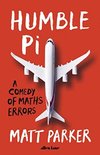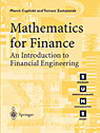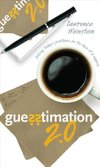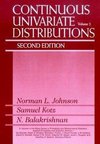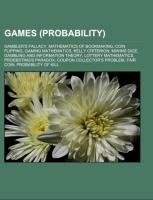
-
 Anglický jazyk
Anglický jazyk
Games (probability)
Autor: Source: Wikipedia
Source: Wikipedia. Pages: 25. Chapters: Gambler's fallacy, Mathematics of bookmaking, Coin flipping, Gaming mathematics, Kelly criterion, Miwins dice, Gambling and information theory, Lottery mathematics, Proebsting's paradox, Coupon collector's problem,... Viac o knihe
Na objednávku, dodanie 2-4 týždne
12.58 €
bežná cena: 14.30 €
O knihe
Source: Wikipedia. Pages: 25. Chapters: Gambler's fallacy, Mathematics of bookmaking, Coin flipping, Gaming mathematics, Kelly criterion, Miwins dice, Gambling and information theory, Lottery mathematics, Proebsting's paradox, Coupon collector's problem, Fair coin, Probability of kill, Feller's coin-tossing constants. Excerpt: In betting parlance, making a book is the practice of laying bets on the various possible outcomes of a single event. The term originates from the practice of recording such wagers in a hard-bound ledger (the 'book') and gives the English language the term bookmaker for the person laying the bets and thus 'making the book'. A bookmaker strives to accept bets on the outcome of an event in the right proportions so that he makes a profit regardless of which outcome prevails. See Dutch book and coherence (philosophical gambling strategy). This is achieved primarily by adjusting what are determined to be the true odds of the various outcomes of an event in a downward fashion (i.e. the bookmaker will pay out using his actual odds, an amount which is less than the true odds would have paid; thus hopefully ensuring a profit). The odds quoted for a particular event may be fixed (as in the case of a football match for example) or may fluctuate to take account of the size of wagers placed by the bettors in the run-up to the actual event (e.g. a horse race). This article explains the mathematics of making a book in the (simpler) case of the former event. For the second method, see Parimutuel betting It is important to understand the relationship between odds and relative probabilities: Thus, odds of a-b (a/b or a to b) represent a relative probability of b/(a + b), e.g. 6-4 (6 to 4) is 4/(6 + 4) = 4/10 = 0.4 (or 40%). A relative probability of x represents odds of (1 - x)/x, e.g. 0.2 is (1 - 0.2)/0.2 = 0.8/0.2 = 4/1 (4-1, 4 to 1). In considering a soccer match (the event) that can be either a 'home win', 'draw' or 'away win' (the outcomes) then the following odds might be encountered to represent the true chance of each of the three outcomes: Home: EvensDraw: 2-1Away: 5-1These odds can be represented as relative probabilities (or percentages by multiplying by 100) as follows: Evens (or 1-1) corresponds to a relative probability of (50%)2-1 corresponds to a relative probability
- Vydavateľstvo: Books LLC, Reference Series
- Rok vydania: 2011
- Formát: Paperback
- Rozmer: 246 x 189 mm
- Jazyk: Anglický jazyk
- ISBN: 9781156675687
